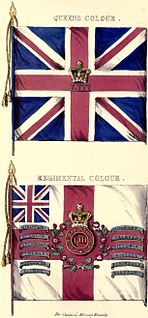
The King's Shropshire Light Infantry (KSLI) was a light infantry regiment of the British Army, formed in the Childers Reforms of 1881, but with antecedents dating back to 1755. It served in the Second Boer War, World War I and World War II. In 1968, the four regiments of the Light Infantry Brigade amalgamated to form The Light Infantry, with the 1st KSLI being redesignated as the 3rd Battalion of the new regiment.
William Dalrymple was a Scottish soldier and Member of Parliament (MP) in the British Parliament and Parliament of Ireland. He was the son of the Hon. George Dalrymple, brother of John Dalrymple, 5th Earl of Stair. Father of John Dalrymple, 7th Earl of Stair.

The 53rd (Shropshire) Regiment of Foot was a British Army regiment, raised in 1755. Under the Childers Reforms it amalgamated with the 85th Regiment of Foot to form the King's Shropshire Light Infantry in 1881.

General Lord George Henry Lennox was a British Army officer and politician who sat in the House of Commons from 1761 to 1790.
The 91st Regiment of Foot was a Line Regiment of the British Army, raised in 1794. Under the Childers Reforms it amalgamated with the 93rd Regiment of Foot to form the Argyll and Sutherland Highlanders in 1881.
The 41st (Welch) Regiment of Foot was an infantry regiment of the British Army, raised in 1719. Under the Childers Reforms it amalgamated with the 69th Regiment of Foot to form the Welch Regiment in 1881.
The 100th Regiment of Foot, or the Loyal Lincolnshire Regiment, was an infantry regiment of the British Army, formed in 1780 and disbanded in 1785. The Loyal Lincolnshire Regiment was reformed in 1794 as the 123rd Regiment of Foot and was again disbanded in 1796.

The 86th Regiment of Foot was an infantry regiment of the British Army, raised in 1793. Under the Childers Reforms it amalgamated with the 83rd Regiment of Foot to form the Royal Irish Rifles in 1881.
The 85th Regiment of Foot was a British Army line infantry regiment, raised in 1793. Under the Childers Reforms it amalgamated with the 53rd (Shropshire) Regiment of Foot to form the King's Shropshire Light Infantry in 1881.
Four regiments of the British Army have been numbered the 91st Regiment of Foot:
General Sir Charles Trollope was a British Army officer who served as colonel of the 1st Battalion King's Shropshire Light Infantry.
The 76th Regiment of Foot , sometimes referred to as 'MacDonnell's Highlanders' after its colonel, John MacDonnell of Lochgarry, was a Scottish Light Infantry regiment raised in the west of Scotland and western isles of Scotland in 1777.
General the Honourable Henry St John was a senior British Army officer and politician who sat in the House of Commons from 1768 to 1784 and briefly in 1802. He also served as a Groom of the Bedchamber.
The 91st Regiment of Foot had a brief existence as a British Army infantry regiment between 1759 and 1763. It was raised in Ireland, posted in turn to the West Indies and the Iberian Peninsula and finally disbanded in 1763. Some of the personnel then transferred to the 3rd Regiment of Foot, then stationed in Menorca. The Regimental Colonel throughout its life was Lt-Gen. Cadwallader Blayney, 9th Baron Blayney who had fought at the Battle of Minden in August 1759.
The 80th Regiment of Foot was a regiment in the British Army from 1778 to 1783.
The 85th Regiment of Foot was a short-lived infantry Regiment in the British Army which was raised in 1777 to provide garrison troops for the West Indies during the American Revolutionary War.
The 96th Regiment of Foot was an infantry regiment in the British Army from 8 April 1780 to 1784. It was one of several regiments raised in consequence of the American Revolutionary War.
The 98th Regiment of Foot (1780–1785) was a short-lived infantry regiment in the British Army which was raised in England in 1780 as a infantry corps for service in India.
The 101st Regiment of Foot (1780–1785) was a short-lived infantry regiment in the British Army which was raised in Ireland in 1780 as an infantry corps for service in India.
The 85th Regiment of Foot was a short-lived British Army regiment during the Seven Years' War. It was recruited at Shrewsbury in 1759 as the first full regiment of light infantry in the British Army and originally intended for service in the North American campaign.



